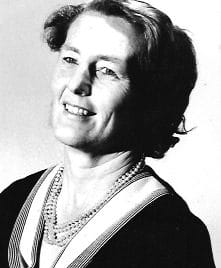
Peggy was a teenager living in London with her mum when World War 11 broke out. She was an only child and her dad had died just a few years before. By day she worked in the Home Office, sometimes accompanying the Home Secretary, Herbert Morrision on government trips. By night she volunteered as an air raid warden. She sounded the siren, helped people to the shelters and ensured no light escaped during blackout to alert the enemy.
She met Andy, 32, a teacher, who lived in the same block of flats. After they married, Peggy was anxious to escape the V bombs and Andy began looking for jobs away from the capital. When he was accepted for a post as Head of English at Bridport Grammar School, they left for West Bay.
Shack by the harbour
The sea views may have been wonderful but the accommodation was essentially a shack on the west side of the harbour, the site of the old shipyard. It didn’t matter, they immediately threw themselves into local life. Their first son, Paul was born in 1945 and within a few months the family had relocated across the harbour into Pier Terrace. Peter was born in 1948.
A young mum, energetic and outgoing, Peggy became social secretary for Bridport Industries, a conglomerate of small net making mills. With a growing circle of friends, she campaigned for the Liberal Party and was a keen member of the Operatic Society, where she would occasionally take the lead role.
Her most vocal performance came during the 500th anniversary of Bridport’s Charter when the town staged a pageant on a nearby field. Peggy’s role was to be ‘rescued’ from a burning tower by local firemen. Her acting was so realistic, the screams could be heard all around town.
Nobody leaves until…
Peggy’s friendships and passion for the arts led to her championing support for an arts society. By this time, the family had moved to Jessope House close to the centre of Bridport and she heard that the Wesleyan chapel was coming up for sale. Convinced this would be the ideal place for an arts centre, she organised a meeting and duly locked the doors, refusing to let people leave until the decision had been reached to buy the chapel.
Bridport Prize born
Now Bridport had an arts centre it had to be financed. An avid reader and book lover, Peggy came up with idea of a short story competition. It was 1973 and Peggy’s eldest son, Paul was working in Barbados and she often visited him there. Pretty soon whenever and wherever she travelled, she went armed with competition leaflets to sprinkle en route. Before long, entries poured in from all over world. Fearless, she wrote to famous authors including Fay Weldon who is still a patron, and the late John Fowles who lived in Lyme became one of the earliest judges.
She ran the competition pretty much single handed in the early years. Son Peter remembers finding Peggy “on her hands and knees in the sitting room with pages and pages of competition entries literally covering the whole floor.”
‘Lady Bridport’
She was the first woman to be given the freedom of the borough. It coincided with husband Andy digging up a rusty old bayonet in their back garden which turned out to be Napoleonic. When Peggy realised the freedom of the borough meant she was allowed to walk through Bridport “with bayonets fixed”, she insisted on acting this out it with their garden discovery. Only once though! She persuaded the council that something more tangible would be practical and they eventually agreed to give her free parking.
Peggy received an MBE from the Queen at Buckingham Palace for her dedication to the arts centre and the Bridport Prize. Her sons went with her to celebrate the award. “She was chuffed to bits and very proud of the fact her work had been recognised in this way,” said Peter.
In later years, Peter, who served in the Royal Navy would receive an MBE for his work as Queen’s Harbour Master in Portsmouth. He was also the Navigational Officer in HMY Britannia, The Royal Yacht, for which he was awarded the Lieutenant of the Royal Victorian Order. Peggy’s late father, a scientist, William Hothersall, received an MBE before he died.
Remarkably, three generations of the same family have been honoured in the same way.
The novel award
Peggy’s husband, Andy died in 1992, by which time they had moved back to Pier Terrace in West Bay, next door to their first proper family home.
Peggy remained very active into her mid 80s. She moved into Harbour House care home in West Bay and on Saturday nights would gently decline joining other residents for supper preferring instead to stay in her room and watch Strictly Come Dancing.
Peggy died aged 92. Nowadays, son Peter and his wife, Michèle are invited to attend the prize giving each year and meet the winner of the novel award set up in Peggy’s memory. “We are honoured to come,” says Peter, “especially as it helps preserve the link between our family, the Arts Centre and the competition.”







